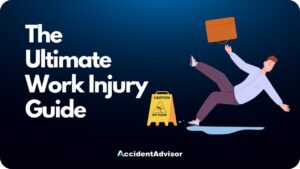After a work injury, you should notify your employer or supervisor immediately so they can begin the process of filing for workers’ compensation on your behalf. If your employer fails to file your claim, you could be entitled to compensation through a personal injury lawsuit by claiming that your employer breached the duty of care they have to their employees.
However, you are not guaranteed a settlement even if your employer files a claim. If you do or say the wrong thing following a work injury, you could be denied compensation. Follow this guide to work injuries to learn what to do after an injury, including the claims process and the timeline for receiving your settlement. Speak with an experienced workers’ comp attorney to learn more about your eligibility for compensation following a work injury, even if you do not believe your injuries are serious.
Table of Contents
- Steps to Take after Being Injured at Work
- How to Prove an Injury is Work-Related?
- Can I Use Any Doctor If Injured at Work?
- What NOT to say to a Workers Comp Doctor?
- How Long Do You Have to File a Workers’ Comp Claim?
- How Long Does it Take for a Workers’ Comp Settlement?
- What If Your Employer Refuses to File a Workers Comp Claim?
- What To Do If Your Workers’ Comp Claim Is Denied?
- Can You Be Fired for a Workers’ Comp Claim?
- When to Hire a Workers’ Comp Lawyer?
- Conclusion
Steps to Take after Being Injured at Work
The first thing you should do after a work injury is seek immediate medical attention from on-site personnel, an emergency room doctor, or an approved workers’ comp physician. Without this medical attention, your claim can be denied later.
The next thing you should do if injured on the job is notify your employer or supervisor. They will then notify their workers’ comp attorneys who will begin the investigation and settlement process for the damages you sustained.
Clear medical documentation of your injury and how it relates to your work activities is key to a successful workers’ compensation claim. However, this can differ depending on whether your work injuries were acute or chronic, though the basic process of notifying your employer, documenting your injuries, and filing your claim is similar.
Acute Work Injuries
If the injury was the result of one incident, also called an acute injury, you should take pictures of the accident scene as well as collect the contact information of any witnesses. You may want to obtain a copy of your employer’s safety and training procedures for your records.
Acute injuries are easier to prove since there is often an identifiable cause of the injury. This could include slipping on a wet floor, falling down stairs, hurting your back while lifting something, etc.
Chronic Work Injuries
Chronic work injuries are more difficult to prove since they happen over time, usually without a single trigger that identifies them as work-related. Your employer may try to claim that your chronic injury resulted from your own activities rather than your work.
Chronic injuries usually result from repetitive tasks such as lifting, typing, driving, hammering, etc. The repetitive motion eventually causes damage to tissues or ligaments that results in injury.
How to Prove an Injury is Work-Related?
To prove an injury is work-related, you need medical documentation linking your injury to your work activities as well as evidence related to the incident. For example, you may take a photo of a slippery floor or ask a witness to recount the accident.
Seeking immediate medical assistance is a significant step since your doctor will be able to document your injury following the accident. Tell them what happened as it relates to your work so that they can report the injury as work-related.
Chronic work injuries are more difficult to prove since work-related behaviors over time often overlap with other everyday activities. You may also be denied compensation for a pre-existing condition in chronic injury cases since workers’ comp attorneys could claim that the injury was not work-related.
To give yourself the best chance of proving that your injury is work-related, notify your employer, seek medical attention immediately after the incident (or after becoming aware of the chronic injury), and hire the services of a workers’ comp attorney.
Can I Use Any Doctor If Injured at Work?
It varies by state, but oftentimes, your employer or their insurance company will choose the doctor. Treating your injury through an unapproved doctor is one of the main reasons that workers’ comp claims are denied.
Some states do allow exceptions and second opinions in some circumstances. Be sure to discuss with your employer or workers’ comp insurance representative to ensure you see the appropriate doctor.
What NOT to say to a Workers Comp Doctor?
Avoid lying, exaggerating, and complaining when speaking to your workers’ comp doctor. What you say can hurt your chances of winning compensation for your work injury.
Never lie about your pre-existing conditions, previous injuries, or the circumstances that led to your current injury. Exaggerations or lies will hurt your chances of being compensated since the workers’ comp attorneys will use your claims to prove that you are hiding the true nature of the injury.
However, you should also refrain from downplaying your symptoms to your doctor as this can prevent them from becoming aware of the full extent of the damage. The truth of the injury will come out eventually, but in the case of downplaying the truth, it may come too late to claim the full extent of the damages.
Finally, you should not criticize your employer to your doctor as doctors hired by workers’ comp are usually in direct communication with your employer. Stick to the truth of the circumstances of your injury and refrain from trying to blame anyone.
How Long Do You Have to File a Workers’ Comp Claim?
States have different statutes of limitations on workers’ comp claims, meaning you have a predetermined amount of time to claim work injuries before your claim can be denied. The time you have differs not only by state but also by the type of work injury you sustained.
For example, in Montana, you have 1 year from the date of the injury to file a claim or 2 years if you have a chronic injury that you didn’t know about. Some states like Ohio require a claim within 6 months from a diagnosis for chronic injuries while others like Pennsylvania say 300 weeks, or about 5.7 years.
Check this list of statutes of limitations by state to learn more about how long you have to file a workers’ comp claim. Note that the time to report the accident to your employer is much shorter, with most states limiting you to 5-30 days after the accident before you become ineligible for a claim.
How Long Does it Take for a Workers’ Comp Settlement?
The time it takes for a workers’ comp case to settle varies depending on when you notify your employer, how long the employer takes to notify the attorneys, whether an investigation is needed, the time it takes to get a diagnosis, and more. It’s not uncommon for workers’ comp settlements to take 6-18 months on average, but it could be longer.
Another factor that influences how long a settlement takes is whether you hire a workers’ comp attorney. They may try to negotiate a settlement amount, which will require evidence, investigation, and deliberation.
Note that in some cases, workers’ comp claims are resolved in as little as 45 days. It all depends on whether your employer complies, your lawyer agrees, and the workers’ comp people settle.
What If Your Employer Refuses to File a Workers Comp Claim?
In most states, your employer is required to file a workers’ comp claim under threat of being sued. You have a right to sue them for negligence if they fail to file your claim and you could be compensated even more due to their breach of the state-mandated duty of care between employers and workers.
Note that if they properly file your claim, you cannot sue them for the injury – this is the purpose of workers’ comp to begin with. Likewise, you can file a workers’ comp claim without fear of losing your other work-related benefits, and if there is a dispute, you may be able to receive disability benefits until the case resolves.
Your employer’s refusal to file for workers’ comp can be grounds for a personal injury lawsuit. Speak with an attorney to learn more.
What To Do If Your Workers’ Comp Claim Is Denied?
If your workers’ comp claim is denied, you must file a state-specific document to appeal the decision, sometimes called a Petition for Benefits. States also have different rules on when this appeal must be filed, though most list 1-2 years after your claim was rejected as the cutoff.
If your claim has been denied and you don’t have representation already in the form of a workers’ comp attorney, now is the time to get one. The process of appealing claims for compensation as well as the legal basis for your negotiations, including re-evaluating the evidence in your case, is complicated without expert help.
Can You Be Fired for a Workers’ Comp Claim?
You cannot be fired for a workers’ comp claim. Your employer funds your workers’ comp insurance so that you can claim any injuries you sustain on the job without having to resort to a lawsuit.
Additionally, you can make a workers’ comp claim without losing your other work-related benefits. However, if you decide to launch a personal injury lawsuit against your employer, you would likely negate any workers’ comp settlement you could receive as well as any future benefits.
You should always ask a workers’ comp lawyer if you are considering suing your employer since you can be fired and may lose your settlement if you do.
When to Hire a Workers’ Comp Lawyer?
If you were injured at work, a workers’ comp attorney can help you gather evidence, file your claim, and refrain from saying anything that would jeopardize your case. Unlike a personal injury case, you may not need an attorney if your employer complies with workers’ comp regulations.
However, if you want to negotiate your claim or make sure you follow the proper procedure, it’s best not to leave your case to chance. If your claim is denied, a workers’ comp attorney can help you make an appeal or convert your case into a personal injury lawsuit to get the compensation you deserve.
Conclusion
If you are injured at work, you need to file a workers’ comp claim, a process which will likely be started by your employer. If your claim is denied, you may need to appeal your claim, and if your employer refuses to file at all, you may need to file a personal injury lawsuit against them. Speak with an experienced workers’ comp attorney to learn how you can be compensated for your work injury without being out of the job.

Rocky Horton
Author
Rocky Horton is a health and safety expert from Chapel Hill, NC. He is the founder of AccidentAdvisor and has been featured in Forbes, Bloomberg, and other publications. Learn more.













